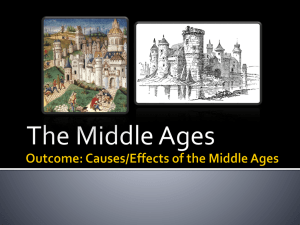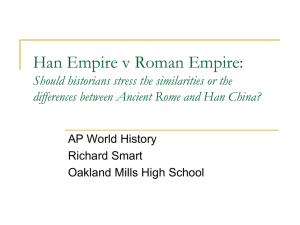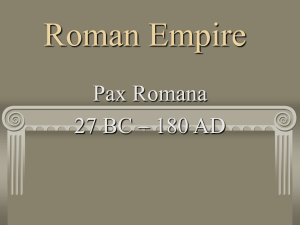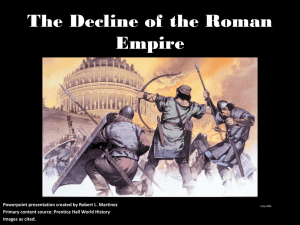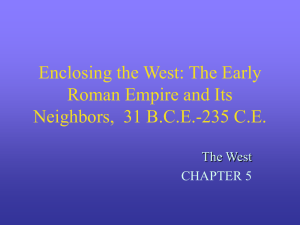Chapter 17
advertisement
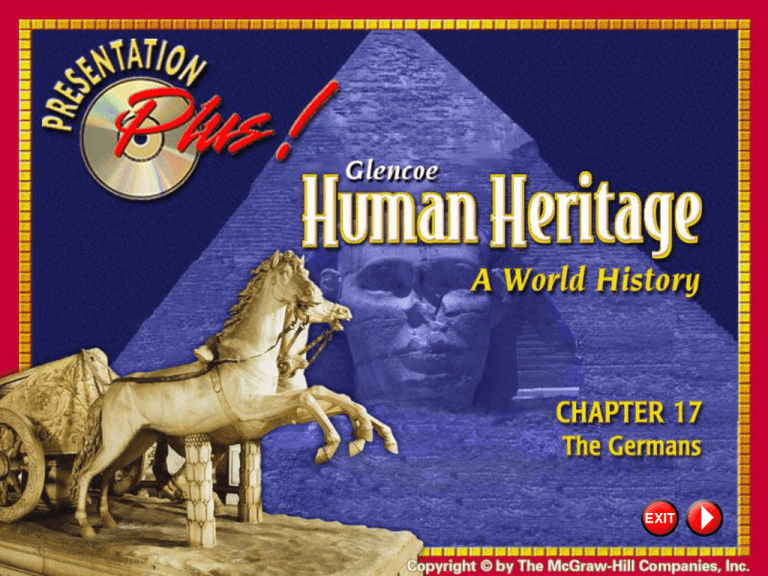
CHAPTER FOCUS SECTION 1 Village Life SECTION 2 The Conquerors CHAPTER SUMMARY & STUDY GUIDE CHAPTER ASSESSMENT 2 Click a hyperlink to go to the corresponding section. Press the ESC key at any time to exit the presentation. Overview • Chapter 17 discusses the Germanic impact on western Europe. – Section 1 compares the cultures of the Romans and the Germans. – Section 2 describes the Germanic invasions and the end of the Roman Empire. 3 Click the mouse button or press the Space Bar to display the information. Objectives After studying this chapter, you will be able to: • describe family life in German villages. • analyze how the love of battle and their laws influenced the Germans. • discuss what role the Goths and the Vandals played in the decline of the Roman Empire. • describe what replaced the Roman Empire in the West. 4 Click the mouse button or press the Space Bar to display the information. Read to Discover • What life was like in German villages • How the Germans’ laws and love of battle influenced them • What role the Goths and Vandals played in the decline of the Roman Empire • What replaced the Roman Empire in the West 5 Click the mouse button or press the Space Bar to display the information. The Chapter Focus is on page 265 of your textbook. Terms to Learn • clans • Wodan • chieftain • Thor • blood feuds • Attila • oath-helpers • Alaric • ordeal • Odoacer • wergeld • Theodoric People to Know Places to Locate • Danube River valley • Valhalla 6 Click the mouse button or press the Space Bar to display the information. Click the Speaker On button to listen to the words. Why It’s Important During the first 400 years after the birth of Christ, the Germans left the forests and marshes of northern Europe in search of warmer climates and better grazing land for their cattle. They slowly drifted south toward the Roman Empire. Attracted by Rome’s wealth and culture, the Germans hoped to live peacefully within the empire’s borders. However, the Romans considered them enemies and for many years fought to keep the Germans out of Rome. By 300 A.D., however, the empire had begun its long decline and could no longer turn back the Germans. So the Romans allowed groups of Germans to move into the Danube River valley, where a blending of German and Roman ways took place. Click the Speaker On button to replay the audio. 7 Village Life • Although the Germans took part in Roman life, they also kept much of their own culture. • They lived in villages of thatched roof huts surrounded by farmlands and pastures. • Women, children, and enslaved people did most farm work. • German dress was simple. • The Germans so strongly believed in hospitality that it was against the law to turn away anyone who came to the door. 9 Click the mouse button or press the Space Bar to display the information. Section 1 begins on page 265 of your textbook. Village Life (cont.) • Feasting, drinking, and dancing were favorite German pastimes. • The Germans spoke a language that later became modern German. • At first, they could not read or write, because their language had no alphabet. • Gradually, they began to use Roman letters to write their own language. 10 Click the mouse button or press the Space Bar to display the information. Warriors • German men were warriors, spending most of their time fighting, hunting, or making weapons. • The Germans were divided into clans, or groups based on family ties. • At first, the Germans gave their greatest loyalty to their clan but later shifted their loyalty to a chieftain, a military leader. • The chieftains provided their men with leadership, weapons, and adventure. • German warrior bands were small and did not have fixed plans of fighting. 11 Click the mouse button or press the Space Bar to display the information. Warriors (cont.) • A successful attack provided warriors with enslaved people, cattle, and other treasures. • The Germans' love of battle was closely linked to their religion, and they expected warriors to win in battle or die trying. • The chief god, Wodan, was the god of war, poetry, learning, and magic and his son Thor was the god of war and thunder. • The Germans believed that goddesses carried warriors who died in battle into the afterlife to Wodan’s hall, called Valhalla, to feast and fight forever. 12 Click the mouse button or press the Space Bar to display the information. Law • Unlike the Romans who believed the law came from the emperor, the Germans believed that the law came from the people, requiring public approval for any changes. • Reckless, often drunken, fighting caused problems in German villages. • Courts were established to keep such fights from becoming blood feuds, or quarrels in which the families of the original fighters seek revenge. 13 Click the mouse button or press the Space Bar to display the information. Law (cont.) • Germans who were accused of a crime would profess their innocence in an oath, and that oath would be defended by an oath-helper, who swore that the accused spoke the truth. • Sometimes guilt or innocence would be decided by ordeal, a severe trial, in which the accused would walk on red-hot coals or be bound and thrown in the water. • If the burns healed in three days or if the accused sank, he was considered innocent. • Courts also could impose fines called wergeld on a person judged as guilty. 14 Click the mouse button or press the Space Bar to display the information. Section Assessment What were some of the duties of a German chieftain? Chieftains gave their men leadership, weapons, and a chance for wealth and adventure. They also kept peace among warriors and sometimes provided them with food and shelter. 15 Click the mouse button or press the Space Bar to display the answer. Section Assessment (cont.) What were some features of German religion? It had many gods who fought and hunted. The chief gods of the German religion were Woden and Thor. Germans also believed that goddesses carried the spirits of fallen warriors to Valhalla for eternal feasting and fighting. 16 Click the mouse button or press the Space Bar to display the answer. Section Assessment (cont.) Making Inferences Why do you think hospitality was so important to the Germans? Answers will vary. 17 Click the mouse button or press the Space Bar to display the answer. Section Assessment (cont.) Recreate the diagram on page 269 of your textbook, and use it to compare strengths and weaknesses of German law. Its strengths were that it helped settle quarrels, and kept the peace. Its primary weakness was that it did not treat people fairly since penalties were determined by a person’s wealth and importance. 18 Click the mouse button or press the Space Bar to display the answer. The Conquerors • The Goths were a Germanic people who lived in the Balkan Peninsula of Europe. • In the late 300s the Huns, led by Attila, or “Little Daddy,” attacked both the Ostrogoths (East Goths) and the Visigoths (West Goths). • After the Huns conquered the East Goths, the West Goths asked the Roman emperor for protection. • Before long, trouble broke out between the West Goths and Roman officials. 20 Click the mouse button or press the Space Bar to display the information. Section 2 begins on page 270 of your textbook. The Conquerors (cont.) • Finally, the West Goths rebelled against the Romans and defeated them at the Battle of Adrianople in 378. • In 410, led by Alaric, they captured and looted Rome and continued on to Gaul and then to Spain, ending the Roman rule in Spain and driving out the Vandals. • In 455, the Vandals attacked and burned Rome, but spared the lives of the Romans. 21 Click the mouse button or press the Space Bar to display the information. The Conquerors (cont.) • The Germanic invasions were one of the three main reasons the Roman Empire in the West began to fall. • In 476, a German general named Odoacer took control and ruled the western empire in his own name for almost 15 years. • Later the East Goths, led by Theodoric, took Italy, killed Odoacer, and set up their own kingdom. 22 Click the mouse button or press the Space Bar to display the information. The Conquerors (cont.) • By 550, the Roman Empire in the West had faded away, replaced by six major and a great many minor Germanic kingdoms. • Many Roman beliefs and practices remained to shape later civilizations. 23 Click the mouse button or press the Space Bar to display the information. Section Assessment What happened to the East Goths in the late 300s? What effect did this have on the West Goths? They were conquered by the Huns. It led them to ask the Roman emperor for protection. 24 Click the mouse button or press the Space Bar to display the answer. Section Assessment (cont.) What did the Vandals do after leaving Spain? They crossed the Mediterranean to North Africa, became pirates, and attacked and burned Rome. 25 Click the mouse button or press the Space Bar to display the answer. Section Assessment (cont.) What replaced the Roman Empire in the West? Six major and many minor Germanic kingdoms replaced the Roman Empire in the West. 26 Click the mouse button or press the Space Bar to display the answer. Section Assessment (cont.) Predicting Consequences What do you think might have happened if Roman officials had treated the West Goths fairly? Explain. Answers will vary. It is possible that if the Romans had treated them fairly they might not have rebelled. 27 Click the mouse button or press the Space Bar to display the answer. Section Assessment (cont.) Refer to the diagram on page 272, and use it to describe important events in the fall of Rome. (Key dates are given.) 378–Romans defeated at Battle of Adrianople; 410–West Goths capture Rome; 455–Vandals attack and burn Rome; 476–Odoacer takes control of the western empire; 550–six major and many minor Germanic kingdoms replace the western Roman empire. 28 Click the mouse button or press the Space Bar to display the answer. Chapter Summary & Study Guide • About 300 A.D., groups of Germans began settling in the Roman Empire. • German warriors were organized into bands, headed by military chieftains. • The Germans’ love of battle was closely linked to their religion. • The Germans determined a person’s guilt or innocence through use of oath-helpers and by ordeal. 30 Click the mouse button or press the Space Bar to display the information. Chapter Summary & Study Guide (cont.) • The Germans believed that law came from the people and that a ruler could not change a law. • The Huns conquered the East Goths and forced the West Goths to turn to Rome for protection. • Harsh treatment of the West Goths by the Romans set off a chain of events leading to the capture of Rome in 410 A.D. 31 Click the mouse button or press the Space Bar to display the information. Chapter Summary & Study Guide (cont.) • A Germanic chieftain took control of Rome in 476 A.D., and by 550 A.D., the Roman Empire had been replaced by a number of Germanic kingdoms. 32 Understanding the Main Idea Why did the Germans begin to move south toward the Roman Empire? The Germans were looking for a warmer climate, grazing land, wealth, and culture. 34 Understanding the Main Idea Why were the Germans allowed to cross the borders of the Roman Empire? They were allowed to cross because the Romans realized they were not strong enough to keep them out 35 Click the mouse button or press the Space Bar to display the answer. Understanding the Main Idea How did German warriors show their loyalty to their chieftain? They obeyed in battle and some gave their chieftains credit for their own brave deeds. 36 Click the mouse button or press the Space Bar to display the answer. Understanding the Main Idea What did the Germans believe the afterlife would be like for warriors? They believed that deceased warriors spent their afterlife in Valhalla, where they would feast and fight forever. 37 Click the mouse button or press the Space Bar to display the answer. Understanding the Main Idea According to German beliefs, from what source did law come? The law came from the people. 38 Click the mouse button or press the Space Bar to display the answer. Understanding the Main Idea What was the reason for the German ordeal by water? They believed water would accept anyone who was pure and reject anyone who was not pure. 39 Click the mouse button or press the Space Bar to display the answer. Understanding the Main Idea Why did the West Goths want to enter the Roman Empire? They wanted to enter because they were afraid the Huns would conquer them. 40 Click the mouse button or press the Space Bar to display the answer. Understanding the Main Idea What happened to Rome after its capture by Odoacer in 476 A.D.? Odoacer did not pick an emperor. Instead, he ruled the empire in his own name for 15 years, until the East Goths invaded and killed him. 41 Click the mouse button or press the Space Bar to display the answer. Critical Thinking What parts of Roman culture did the Germans adopt? What parts of their own culture did they keep? They became farmers, traded with Romans, and joined the Roman army. Some became Christians. They lived in villages and spoke what later became modern German. 42 Click the mouse button or press the Space Bar to display the answer. Critical Thinking Imagine you will soon become a Germanic chieftain. Explain what you would provide for your band of warriors. Answers will vary. 43 Click the mouse button or press the Space Bar to display the answer. Critical Thinking What would you have liked and disliked about living in a German village? Answers will vary. 44 Click the mouse button or press the Space Bar to display the answer. Critical Thinking Do you believe the penalty for a crime should depend on a person’s wealth or importance? If not, on what should it depend? Explain. Answers will vary. 45 Click the mouse button or press the Space Bar to display the answer. Geography in History Place Refer to the map on page 271 of your textbook. Access to the sea played an important role in the economy of each Germanic kingdom. Which kingdom had the longest seacoast? About how many miles long was it? Ostrogoth; about 2,000 miles 46 Click the mouse button or press the Space Bar to display the answer. “If I may join your army I swear on our god of war, Zeus, I will fight hard. I have a letter from my chieftain saying I am a good warrior.” Why would this warrior speaking to a Roman not be considered a true German? 47 Explore online information about the topics introduced in this chapter. Click on the Connect button to launch your browser and go to the Human Heritage: A World History Web site. At this site, you will find interactive activities, current events information, and Web sites correlated with the chapters and units in the textbook. When you finish exploring, exit the browser program to return to this presentation. If you experience difficulty connecting to the Web site, manually launch your Web browser and go to http://www.humanheritage.glencoe.com 49 50 300 A.D. 550 A.D. Romans allow groups of Germans to cross their borders Roman Empire is replaced by Germanic kingdoms 410 A.D. Alaric captures Rome 378 A.D. 455 A.D. Battle of Adrianople Vandals sack Rome Click the mouse button or press the Space Bar to display the information. Theodoric the Great c. 454 A.D.-526 A.D. Germanic King Theodoric was king of the East Goths, a Germanic people from eastern Europe. When Rome fell in 476 A.D., he took part in the struggle. About 500 A.D., Theodoric declared himself king of Italy. As king, he encouraged the Roman and Germanic peoples to get along. He respected Roman customs, and during his reign peace and prosperity returned. 51 End of Custom Shows WARNING! Do Not Remove This slide is intentionally blank and is set to auto-advance to end custom shows and return to the main presentation.

